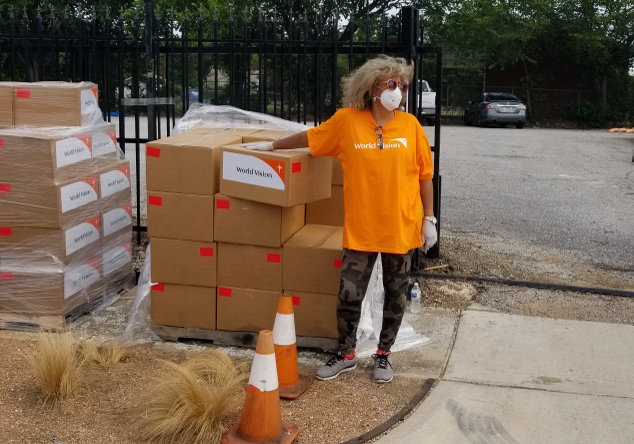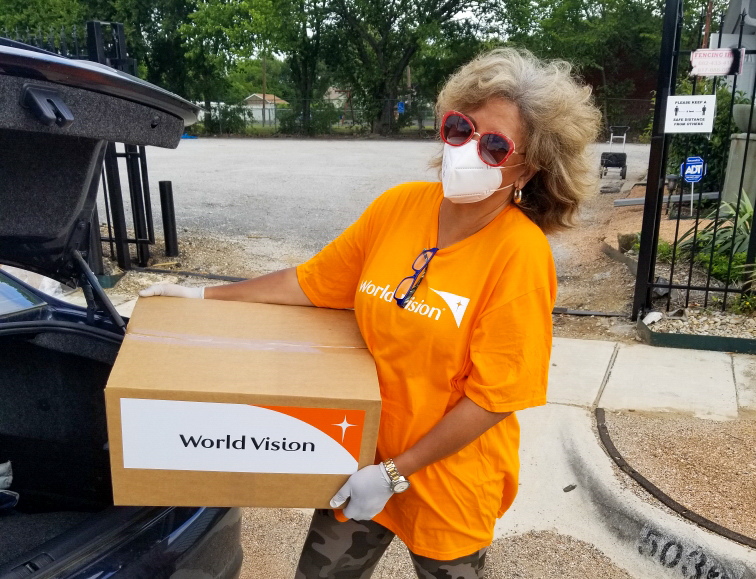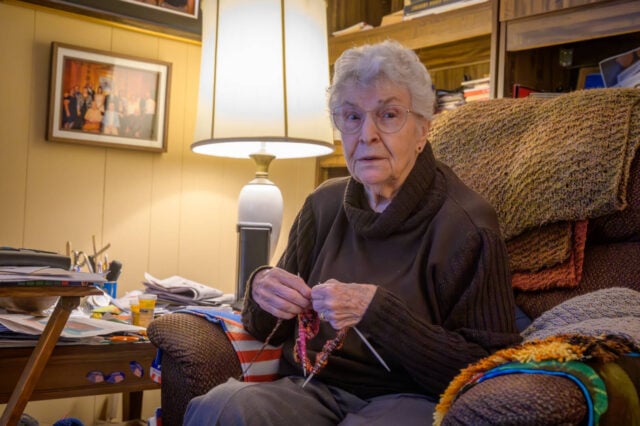Two months after the global pandemic hit, Pastor Helen Epps and her husband went fishing. It was their first real chance to take time off since the COVID-19 pandemic changed everything. “This has been devastating. That’s why I just had to get away and go fishing,” she says.
Helen sat at the lake in her overalls and gloves. She even caught a perch. A big one. It’s fishing, after all. “We don’t want to leave,” she says. “It’s so tranquil and peaceful out here. You don’t know that there’s a pandemic.”
And yet, COVID-19 would be waiting for her as she returned to her ministry — Morning Star Prayer Center in Fort Worth, Texas. With needs on the rise in her community, Helen and the volunteers at the center have been distributing food and other supplies with World Vision’s Family Emergency Kits since April 2020.
She’s kept a prayer line open every night to pray for anyone who calls. The calls can be overwhelming. “Sometimes I have to fight the battle not to get depressed,” says Helen.
But it’s not her first encounter with sorrow.
Sorrow but also support
Helen’s mother ran away from home at a young age. When she got pregnant and gave birth, she gave custody of Helen to her grandparents. When Helen was about 8 years old, her mother was murdered. When Helen turned 15, her great grandmother developed dementia.
Her great grandparents loved her and taught her the value of hard work. “Growing up, somebody always helped me,” she says. She worked in a variety store as a young girl. When she grew up, she worked in real estate. She married and her husband worked in corporate America. They lived in a big house, drove a nice car, and had no debts. But then he got cancer and after 15 months, passed away.
At 44, Helen was single again, raising her children on her own, struggling but putting her children through college.
Answering God’s call
Not long after Helen remarried in 2005, she heard God’s voice telling her to open a house of prayer. Having grown up in the Pentecostal church, she knew of a prayer room, but had never heard of a house of prayer. At first, she ignored the voice thinking it certainly couldn’t be God talking to her. But the voice kept bothering her until she put her real estate experience to work and found an abandoned church.
She first learned about World Vision’s work around the world while on a trip to Ethiopia. Then another ministry introduced her to World Vision’s team in North Texas.
After partnering with World Vision, God began to open doors. “I went from a pickup truck of stuff to a 15-foot U-Haul to a 26-footer,” Helen says. “World Vision increased our capacity.” All the supplies they receive go to help families in need.
Pandemic increases the struggle
The Fort Worth, Texas, community is made up of hardworking people who need a hand-up, says Helen. She helps families where both the husband and wife may work, but together they make around $20 per hour. And this was before COVID-19 hit. They’re also serving families who once were middle income, but have now lost their jobs so are leaning on food distributions to help get by.
“It’s just made it harder for a lot of people,” she says. “For those people who were barely making it, they’re really having to struggle right now.”
Prior to COVID-19, Helen and the team at Morning Star Prayer Center provided weekend backpacks, sending food home for children identified by the school district as having the biggest needs. But as with many businesses and churches, the virus caused them to temporarily close their doors, and now their donations are down.
“I don’t think we can imagine the effect it’s had on some families,” Helen says. “People are having to ask for help that have never asked for help.”
Ministering through food first
World Vision reached out to Helen with the idea of partnering to distribute Family Emergency Kits to the most vulnerable families. Each kit includes enough shelf-stable food to feed a family of five for a week. It also includes sanitizing and school supplies. “When the emergency kits came along, that was an awesome blessing,” says Helen.

She says that while the kits may not solve all of a family’s troubles, every little bit helps. They might allow the family to pay the electricity bill because they don’t have to use that money on groceries that week. Small gifts can have a big impact.
“Don’t stop giving — because they’re making a difference in people’s lives. It’s changing people’s lives. It’s giving people hope,” says Helen. “They know that somebody is thinking about them.”
Thinking about people is what Helen does, whether fishing for perch on a tranquil lake or acting as a fisher of men on the struggling streets of Fort Worth. Wherever she drops her line, she sees small miracles through her partnership with World Vision and their donors — the ripple effect that happens when hope overtakes hardship and blessings flow.


